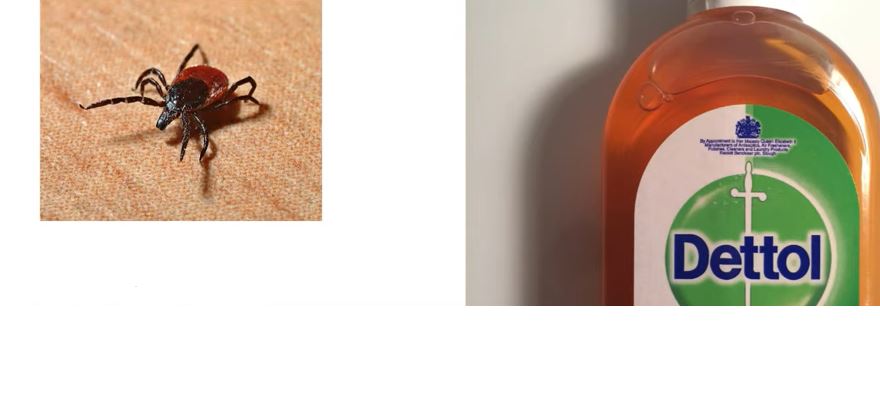Do you have a bottle of Dettol in your home? Can Dettol Kill Ticks on Dogs?
Is Dettol a safe method of killing ticks attached to a dog? What are some better alternatives?
In this article, we’ll discuss if Dettol kills ticks on dogs.
Can Dettol Kill Ticks on Dogs?
Yes, but should you use it on your canine companions? Dettol produces disinfectants and antiseptics. You can use Dettol to kill ticks around your home by spraying it generously all over indoor spaces. Tick will die on contact with Dettol.
One of its active ingredients is phenol chloroxylenol which is deemed toxic when ingested. It can also cause itchy skin.
Small amounts of Dettol have been used on dogs, but we recommend safer options such as flea and tick shampoos or collars instead.

Is Dettol Safe to Use on Dogs?
Dettol Antiseptic Disinfectant Liquid is safe on human skin. Dogs may experience irritation. With a mixture of water and Dettol Antiseptic Disinfectant Liquid, you can safely create a diluted dose to apply on your dog.
You can do so when the tick is still on the dog, but it’s better to remove the tick first. Cats are much more susceptible to the harsh side effects of ingesting or inhaling Dettol Antiseptic Disinfectant Liquid.
The active ingredient is phenol chloroxylenol and it’s dangerous on animals in high concentrations. We recommend not using Dettol on dogs as there are safer options.
What Can I Wash My Dog With for Ticks?
If you are looking to wash, clean, and disinfect your canine companion to free them or prevent any ticks from approaching, you can apply the following treatments.
We have not included Dettol due to some animals reacting poorly to chloroxylenol contained within. Here is our list of the frontrunners in treating or preventing ticks:
- TropiClean Natural Flea & Tick Soothing Shampoo
- PetArmor Flea & Tick Dog Shampoo
- Espree Flea & Tick Shampoo
- Vet’s Best 50 Count Flea + Tick Wipes
- Richard’s Organics Flea & Tick Shampoo
- Sentry Pro Flea & Tick Shampoo For Dogs And Puppies
- Sentry Flea & Tick Sunwashed Linen Scent Shampoo for Dogs & Puppies
You can also try washing your dog with apple cider vinegar, Dawn Dish soap and water for alternative treatment methods.
We recommend going with a commercial product aimed at killing ticks and preventing them returning because this is not a pest that we wish to be attached to us for any period of time given the health risks associated.

What Kills Ticks on Dogs Naturally?
A natural solution for killing a tick is only recommended when there is an isolated issue. If this is reoccurring or an infestation of ticks is present, it’s time to consider spraying the area with insecticide or a product like Dettol. Here are our top 3 favorite natural methods of killing ticks on dogs.
- When attempting to naturally kill a tick on a dog, nothing beats a pair of tweezers. You must gently pull out the pest to reduce the time it spends living off your canine companion. Kill them in a cup of bleach or rubbing alcohol afterwards.
- Lighting a match and touching the tick may work to kill it as well.
- A natural solution to bathe your dog’s body consists of 2 teaspoons of apple cider vinegar, a few drops of Dawn Dish Soap and water.
Is Dettol Poisonous?
One of the compounds in Dettol is poisonous. The 3 main compounds of Dettol include:
- chloroxylenol
- pine oil
- castor oil
Although pine oil and castor oil are non-toxic, chloroxylenol is. Dettol should never be ingested. It is hard to prevent a feline or canine from licking its body and absorbing the contents of Dettol on his or her fur.
The warning label suggests that Dettol should never be swallowed. The active ingredient chloroxylenol can kill fish.
The product is toxic and should only be used when necessary in killing germs or bacteria associated with cuts, scrapes or wounds.
After pulling out a tick, you can gently rub some Dettol and water on a cotton pad with some compression onto a pet’s skin in the area where the pest was attached.
Is Dettol Spray Safe for Animals?
The antibacterial chemical known as Chloroxylenol is toxic. It kills germs and is safe in a mixed solution under the brand, Dettol.
The company does not wish to advocate its use on animals. The product is best served as an antiseptic or disinfectant in small quantities on humans and generously applied in household settings to kill:
- Viruses
- Germs
- Bacteria
- Insects
- Lizards
Fleas and ticks will die on contact with Chloroxylenol found in Dettol, but it is not worth applying it directly on your favorite animal.

Can Dettol Cause Itching?
Yes. In some cases Dettol can cause itching. Anyone that has eczema, dry skin or dermatitis are highly susceptible to the side effects that this product can cause on their skin. Some reactions include:
- Pruritus
- Erythema
- skin scaling
- itching
- stinging
The chloroxylenol in Dettol can cause skin burning. Pine oil and castor oil mixed into the product helps to prevent this. Nevertheless, see a doctor if you notice the following symptoms:
Corrosion of:
- oral mucosa
- larynx
- gastrointestinal tract
- bradycardia
or
- hypotension
- renal failure
Conclusion
Dogs have skin issues. Mine does. I would never apply Dettol to her skin. This is my choice as her best friend and caregiver. Some may object. They can feel assured that they have diluted the Chloroxylenol found in Dettol to make it harmless, yet effective in killing ticks on dogs.
I prefer a little dish soap, a pair of tweezers and careful manual removal. Dettol is better used as a spray in surrounding areas or crevices to prevent ticks from arriving into our indoor spaces. Do not use Dettol on cats.
Thanks for visiting ThePestManagement.com for the best information to help you to make the pest control process easy, safe & affordable.

